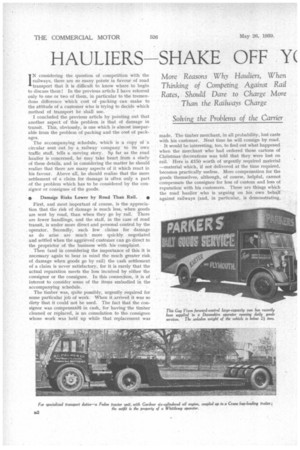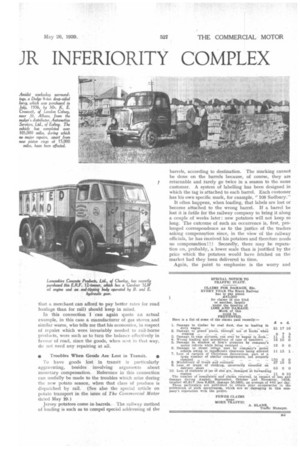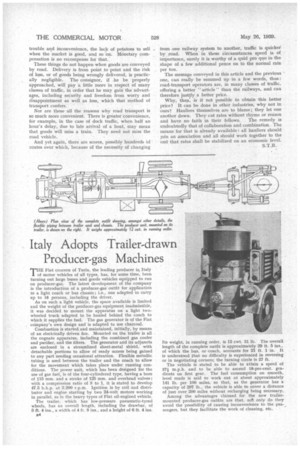HAULIERS SHAKE OFF Y( JR INFERIORITY COMPLEX
Page 36

Page 37

Page 38

If you've noticed an error in this article please click here to report it so we can fix it.
More Reasons Why Hauliers, When Thinking of Competing. Against Rail Rates, Should Dare to Charge More Than the Railways Charge
Solving the Problems of the Carrier 1N considering the question of competition with the railways, there are so many points in favour of road transport that it is difficult to know where to begin to discuss them! In the previous article I have referred only to one or two of them, in particular to the tremendous difference which cost of •packing can make to the attitude of a customer who is trying to decide which method of transport he shall use.
I concluded the previous article by pointing out that another aspect of this problem is that of damage in transit. This, obviously, is one which is almost inseparable from the problem of packing and the cost of packages.
The accompanying schedule, which is a copy of a circular sent out by a railway company to its own traffic staff, tells a moving story. Sp far as the road haulier is concerned, he may take heart from a study of these details, and in considering the matter he should realize that there are many aspects of it which react in his favour. Above all, he should realize that the mere settlement of a claim for damage is often only a part of the problem which has to be considered by the consignor or consignee. of the goods.
0 Damage Risks Lower by Road Than Rail. 0 First, and most important of course, is the appreciation that the risk of damage is much less, when goods are sent by road, than when they go by rail. There are fewer handlings, and the staff, in the case of road transit, is under more direct and personal control by the operator. Secondly, such few claims for damage as do arise are much more quickly, negotiated and settled when the aggrieved customer can go direct to the proprietor of the business with his complaint.
Then (and in considering the importance of this it is necessary again to bear in mind the much greater risk of damage when goods go by rail) the cash settlement of a claim is never satisfactory, for it is rarely that the actual reparation meets the loss incurred by either the consignor or the consignee. In this connection, it,is of interest to consider SOIlle. of the items embodied in the accompanying schedule.
The timber was, quite possibly, urgently required for some particular job of work. When it arrived it was so dirty that it could not be used. The fact that the consignor was compensatell in cash, for having the timber cleaned or replaced, is no consolation to the consignee whose work was held up while that replacement was made. The timber merchant, in all probability, lost caste with his customer. Next time he will consign by road.
It would be interesting, too, to find out what happened when the merchant who had ordered those cartons of Christmas decorations was told that they were lost on rail. Here is £150 worth of urgently required material —material which, if not delivered at the time required, becomes practically useless. Mere compensation for the goods themselves, although, of course, helpful, cannot compensate the consignee for loss of custom and loss of reputation" with his customers. These are things which the road haulier who is arguing on his own behalf against railways (and, in particular, is demonstrating, that a merchant can afford to pay better rates for road haulage than for rail) should keep in mind.
In this connection I can again quote an actual example, in this case a manufacturer of gas stoves_and similar wares, who tells me that his economies, in respect of repairs which were invariably needed to rail-borne products, were such as to turn the balance effectively in favour of road, since the goods, when sent in that way, do not need any repairing at all.
• Troubles When Goods Are Lost in Transit. •
To have goods lost in transit is particularly aggravating, besides involving arguments about monetary compensation. Reference in this connection can usefully be made to the troubles which arise during the new potato season, when that class of produce is dispatched by rail. (See also the special article on potato transport in the issue of The Commercial Motor dated May 19.)
Jersey potatoes come in barrels.. The railway method of loading is such as to compel special addressing of the barrels, according to destination. The marking cannot be done on the barrels because, of course, they are returnable and rarely go twice in a season to the same customer. A system of labelling has been designed in which the tag is attached to each barrel. Each customer has his own specific mark, for example, "108 Sudbury."
It often happens, when loading, that labels are lost or become attached to the wrong barrel. If a barrel be lost it is futile for the railway company to bring it along a couple of weeks later : new potatoes will not keep so long. The outcome of such an occurrence is, first, prolonged correspondence as to the justice of the traders asking compensation since, in the view of the railway officials, he has received his potatoes and therefore needs no compensation ! !! Secondly, there may be reparation on, probably, a lower scale than is justified by the price which the potatoes would have fetched on the market had they been delivered to time.
Again, the point to emphasize is the worry and trouble and inconvenience, the lack of potatoes to sell . when the market is good, and so on. Monetary compensation is no recompense for that.
These things do not happen when goods are conveyed by road. Delivery is from point to point and the risk of loss, or of goods being wrongly delivered, is practically negligible. The consignor, if he be properly approached, will pay a little more in respect of many classes of traffic, in order that he may gain the advantages, including security and freedom from worry and disappointment as well as loss, which that method of transport confers.
Nor are these all the reasons why road transport is so much more convenient. There is greater convenience, for example, in the case of dock traffic, when half an hour's delay, due to late arrival of a boat, may mean that goods will miss a train. They need not miss the road vehicle.
And yet again, there are scores, possibly hundreds of routes over which, because of the necessity of changing from one railway system to another, traffic is quicker by road. When in these circumstances speed is of importance, surely it is worthy of a quid pro quo in the shape of a few additional pence on to the normal rate per ton.
The message conveyed in this article and the previous one, can really be summed up in a few words, thus: road-transport operators are, in many classes of traffic, offering a better " article " than the railways, and can therefore justify a better price. Why, then; is it not possible to obtain this better price? It can be done in other industries, why not in ours? Hauliers themselves are to blame; they let one another down. They cut rates without rhyme or reason and have no faith in their fellows. The remedy is undoubtedly that of collaboration and combination. The means for that is already available: all hauliers should join an association and all should work together to the end that rates shall be stabilized on an economic level.
S.T.R.




















































































